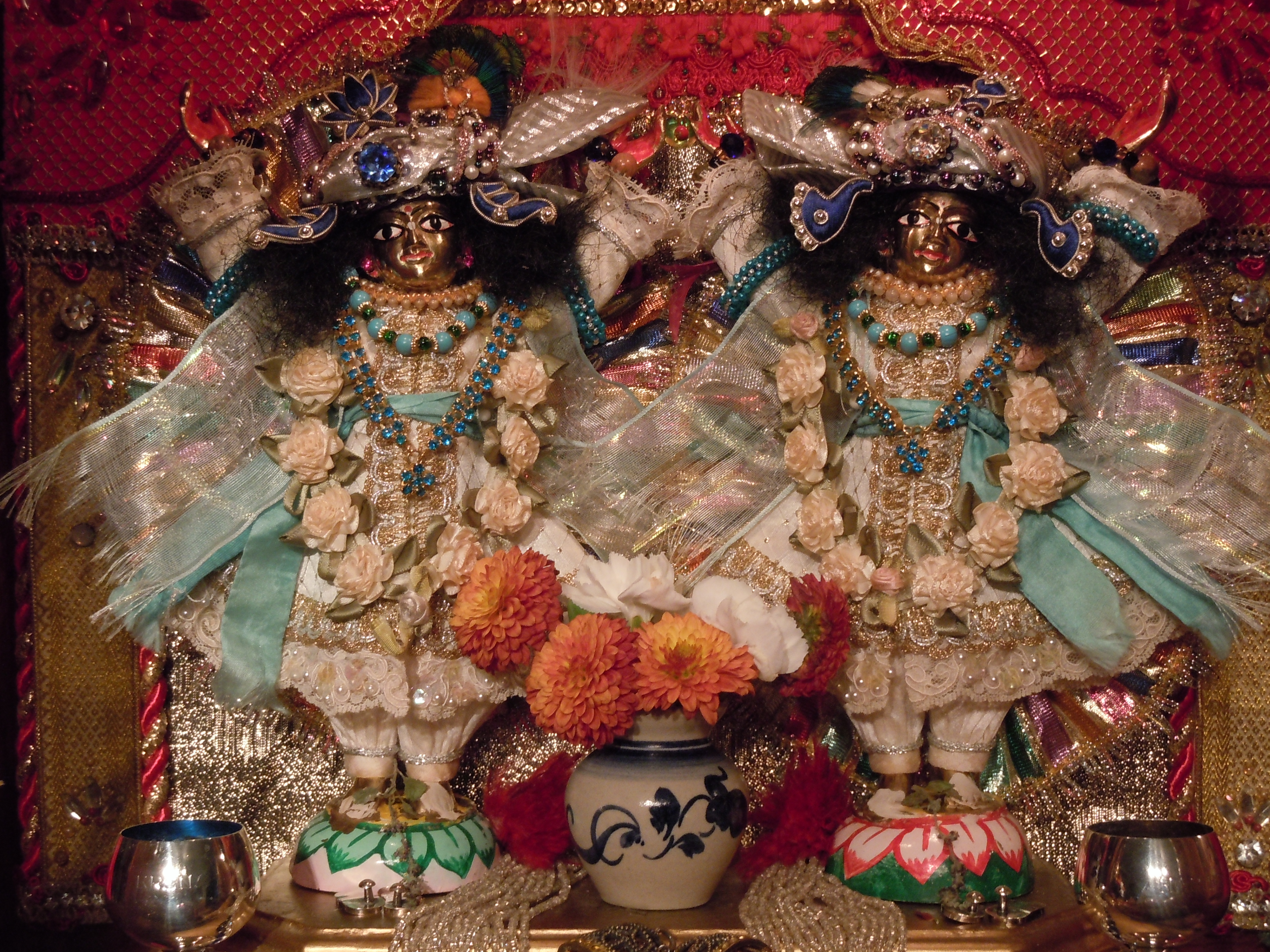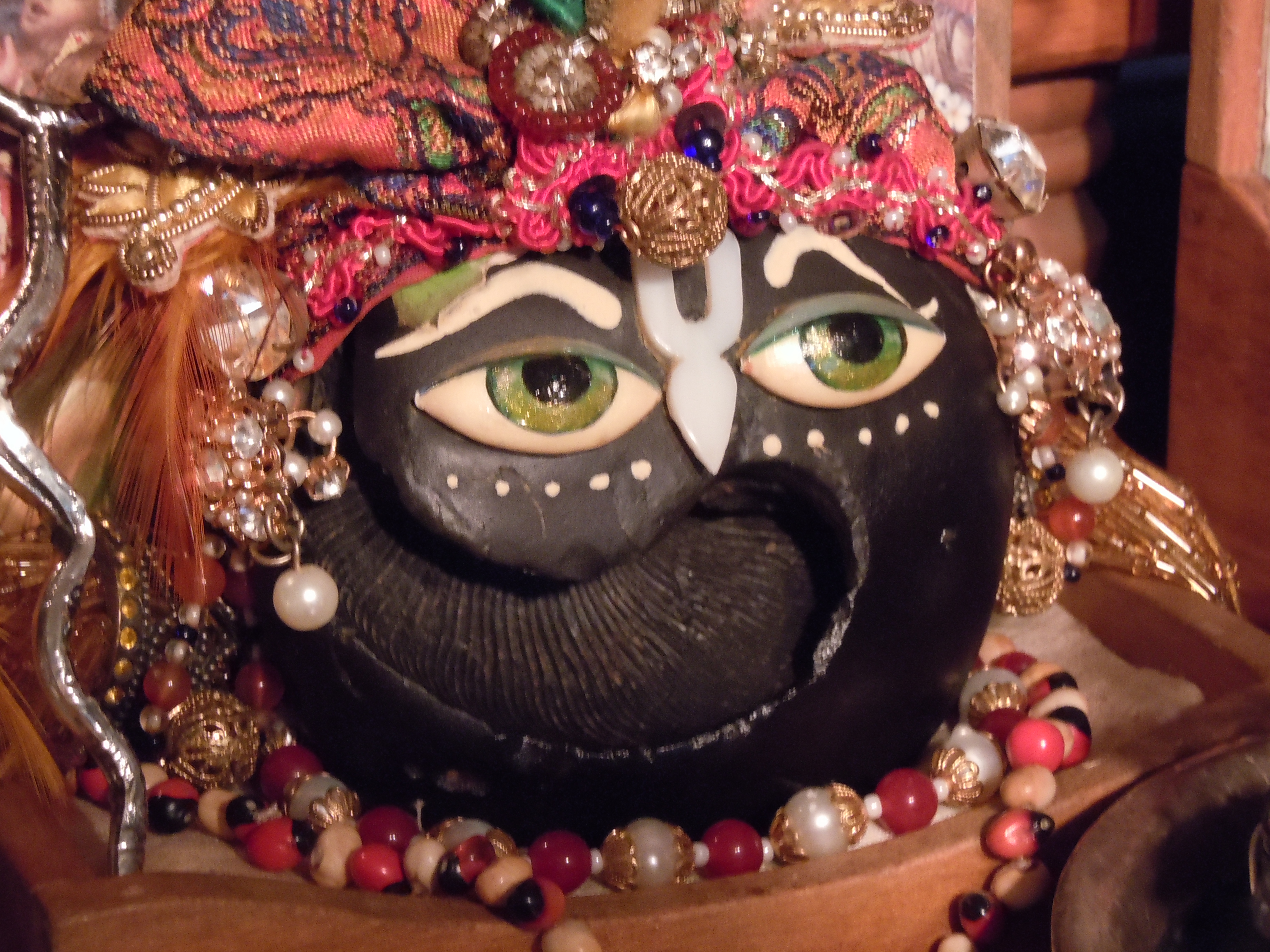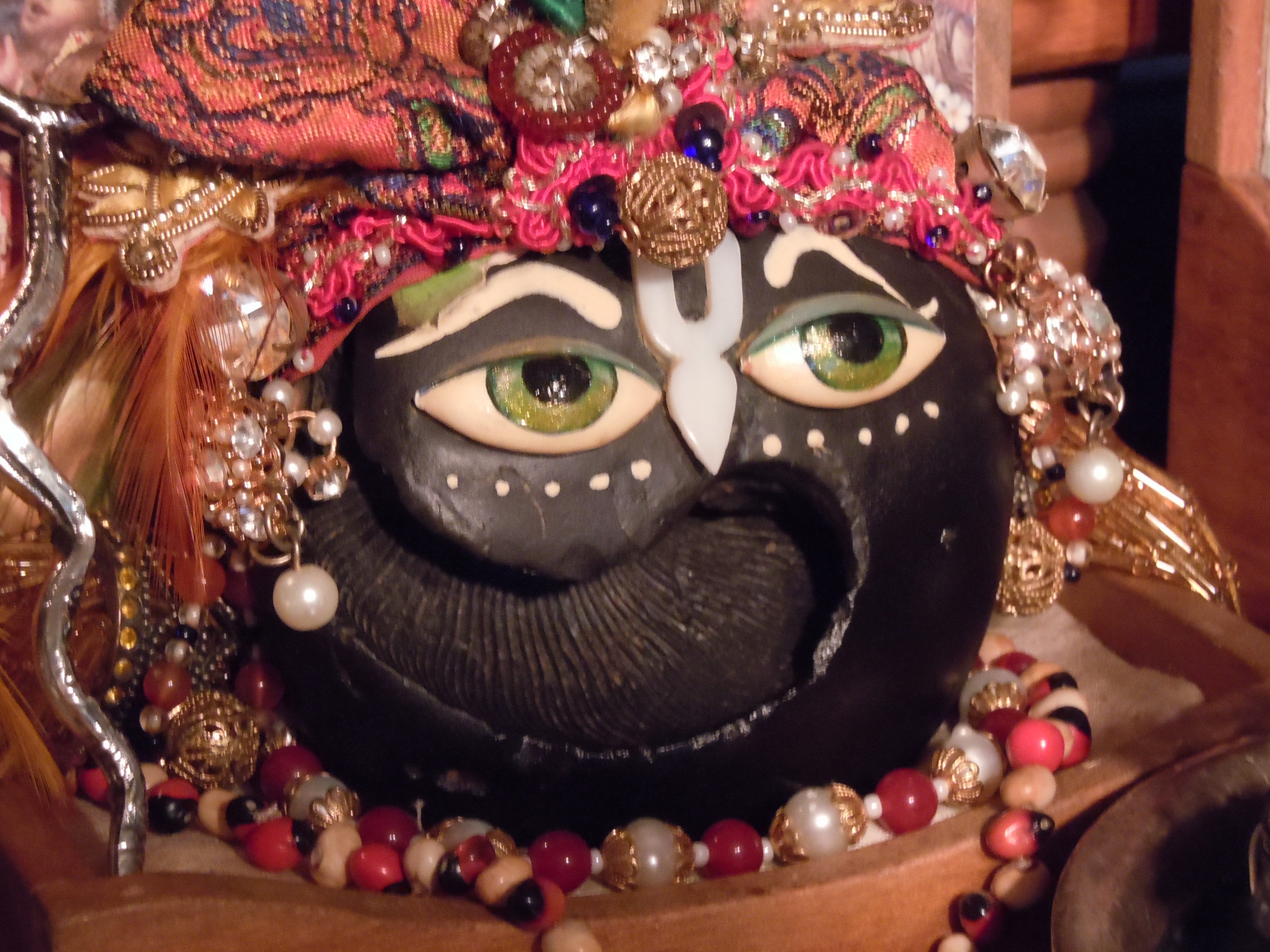Srila Prabhupada: “Sometimes, they are surprised how one man can write so many books, but it is Krsna’ s grace. Otherwise, not possible. Human being, it is not possible
Exposing Dayalu Nitai Dasa’s Myopia
Keeping in mind
Expose on Indian TV about corruption in ISKCON Mumbai– against Banglore temple
A Heart Touching Pastime Of Srila Prabhupada
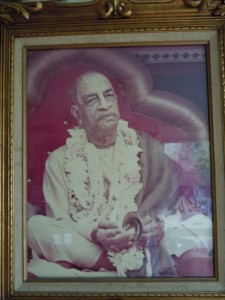 Sripada Hrdayananda Babaji Maharaja was born in Radha Kunda and has been a pujari for 78 years. He lives next to the Radha Damodara Temple. At the beginning of the interview, upon being asked if he knew Srila Prabhupada, Babaji Maharaja began to cry, “Never have I seen anyone do sadhana like he did. I have lived all my life in Vraja and I have never seen anyone like him. Prabhupada did many arduous things, he worked very hard there at the Radha Damodara Temple. At that time it was austere, undeveloped, and very muddy and dirty with no facilities.
Sripada Hrdayananda Babaji Maharaja was born in Radha Kunda and has been a pujari for 78 years. He lives next to the Radha Damodara Temple. At the beginning of the interview, upon being asked if he knew Srila Prabhupada, Babaji Maharaja began to cry, “Never have I seen anyone do sadhana like he did. I have lived all my life in Vraja and I have never seen anyone like him. Prabhupada did many arduous things, he worked very hard there at the Radha Damodara Temple. At that time it was austere, undeveloped, and very muddy and dirty with no facilities.By doing Arcana , one ” confirms himself as not body but spirit–SP
1.) #8) A devotee must visit a Viṣṇu temple at least once or twice every day, morning and evening NOD Ch 6
2.)….The actual import of the verse is that one must see the form of Govinda if one at all wants to forget the nonsense of material friendship, love and society.
(Below, is the actual verse spoken of above..)
Rūpa Gosvāmī has stated that five kinds of devotional activities-namely, residing in Mathurā, worshiping the Deity of the Lord, recitingŚrīmad-Bhāgavatam, serving a devotee, and chanting the Hare Kṛṣṇa mantra-are so potent that a small attachment for any one of these five items can arouse devotional ecstasy even in a neophyte.
Regarding worship of the form of the Lord, or Deity, Rūpa Gosvāmī has written the following verse:
"My dear friend, if you still have any desire to enjoy the company of your friends within this material world, then don’t look upon the form of Kṛṣṇa, who is standing on the bank of Keśī–ghāṭa [a bathing place in Vṛndāvana]. He is known as Govinda, and His eyes are very enchanting. He is playing upon His flute, and on His head there is a peacock feather. And His whole body is illuminated by the moonlight in the sky."
The purport of this verse is that if someone becomes attached to theŚrī Mūrti, or Deity of Kṛṣṇa, by worshiping at home, then he will forget his relationships of so-called friendship, love and society. Thus it is the duty of every householder to install Deities of the Lord at home and to begin the process of worshiping along with all of his family members. This will save everyone from such unwanted activities as going to clubs, cinemas, dancing parties, smoking, drinking, etc. All such nonsense will be forgotten if one stresses the worship of the Deities at home.
Rūpa Gosvāmī further writes, "My dear foolish friend, I think that you have already heard some of the auspicious Śrīmad-Bhāgavatam,which decries seeking the results of fruitive activities, economic development and liberation. I think now it is certain that gradually the verses of the Tenth Canto of Śrīmad-Bhāgavatam, describing the pastimes of the Lord, will enter your ears and go into your heart."
In the beginning of the Śrīmad-Bhāgavatam it is said that unless one has the capacity to throw out, just like garbage, the fruitive results of ritualistic ceremonies, economic development and becoming one with the supreme (or salvation), one cannot understand Śrīmad-Bhāgavatam. The Bhāgavatam deals exclusively with devotional service. Only one who studies Śrīmad-Bhāgavatam in the spirit of renunciation can understand the pastimes of the Lord which are described in the Tenth Canto. In other words, one should not try to understand the topics of the Tenth Canto, such as the rāsa–līlā (love dance), unless he has spontaneous attraction for Śrīmad-Bhāgavatam.One must be situated in pure devotional service before he can relishŚrīmad-Bhāgavatam as it is.
Continue reading
Kanistha imitating maha bhagavat is rascal–SP
Conv Mayapur Feb 4 1976
Prabhupāda: They are all in the material world, karmīs. Karma–kāṇḍa,ritualistic ceremonies. Prahlāda Mahārāja has described them. What is that very word used? And meaning is "one who cannot control their senses." Avijita–indriya. Ajitendriyāṇām, ajita, "one who could not conquer the senses," they are called karmīs. Ajitendriyāṇām. So all these penances,silence, meditation, then studying the Vedic literature, and so many things are there. Prahlāda Mahārāja, in one word he says, "They are meant forajitendriyāṇām, one who could not conquer over the senses, for them." And for a devotee, one who is actually pure devotee of Kṛṣṇa, he is saguṇān samatītyaitān [Bg. 14.26]. Not that a tiny devotee can claim that he has overcome the influence of this world. No. This is called paramahaṁsa.Sa guṇān samatītyaitān [Bg. 14.26]. Not that because you have taken to devotional…, you have become immediately. The process has begun immediately, curing process. But we should not think that we have become perfect. That is wrong. Yajña–dāna–tapaḥ–karma na tyājyam. Therefore you must follow the regulative principles. As soon as you become a rascal—"Now I have become advanced. I don’t require to chant sixteen rounds. I can do whatever I like"—then he has gone to hell. Upstart, immediately he becomes paramahaṁsa. He’s a rascal. He was given the path of becoming paramahaṁsa. One is admitted in the school, he must learn, and one day he will become M.A. But simply by entering in the school, if he says, "I am M.A.," that is rascaldom. This is a chance. To become jitendriya is very difficult task. But it is easy if he immediately becomes a pure devotee.Anyābhilāṣitā-śūṇyam: [Brs. 1.1.11] "Everything make zero, all desire, except Kṛṣṇa consciousness." That is wanted. But that does not become very easily done. One has to try very rigidly; then he’ll be paramahaṁsa.Therefore amongst the devotees, there are three grades: kaniṣṭha–adhikārī,madhyama–adhikārī, and uttama–adhikārī. So if the kaniṣṭha–adhikārī thinks that "I have become uttama–adhikārī," then he’s a rascal. He’s a rascal. If he wants to imitate the uttama–adhikārī, then he’s a rascal.
Glorify guru by– fighting for him–SP
Harikeśa: You so completely destroy the opposition, it’s very hard to say anything more.
Prabhupāda: Yes. That you have to prove. You can eulogize your Guru Mahārāja, but you have to learn it and face the public and be strong to defend yourself. That is success. Not by praising your Guru Mahārāja. You’ll praise your Guru Mahārāja. That is not very difficult. But be victorious to the opposing elements. Then you will praise your Guru Mahārāja nicely. At home, you can praise your Guru Mahārāja, and Guru Mahārāja be satisfied, "Oh, my disciples are praising me." That is not very…. That is good. Respectful. That is the qualification. But you have to fight. Then your Guru Mahārāja will be glorified.
Conv dec 26 1975
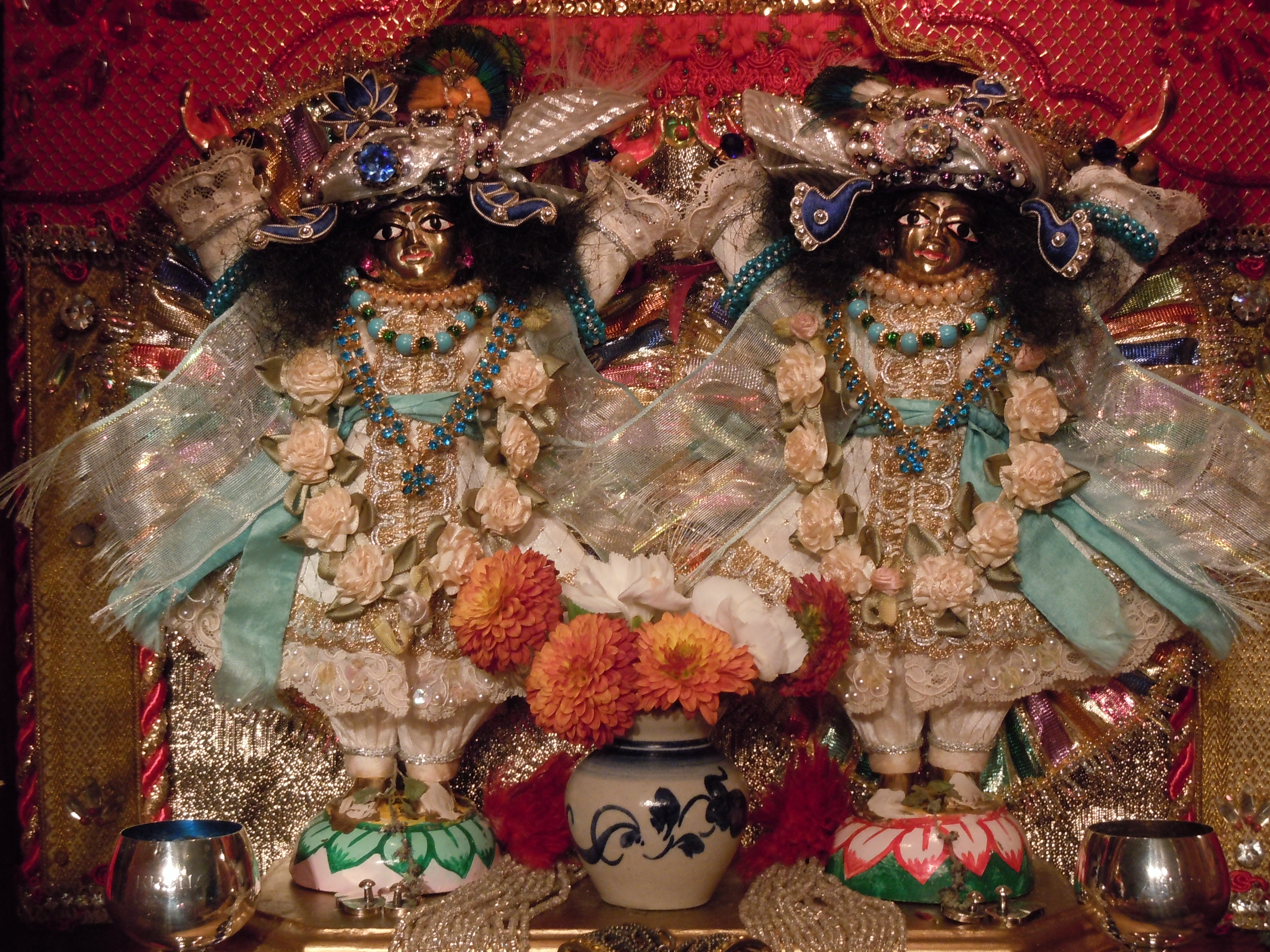
False designations(body consciousness) have caused havoc throughout the world–SP
Pradyumna: "As long as one identifies himself as belonging to a certain family, a certain society, or a certain person, he is said to covered with designations. When one is fully aware that he does not belong to any family, society, or country, but is eternally related to Kṛṣṇa, he then realizes that his energy should be employed not in the interests of so-called family, society or country, but in the interests of Kṛṣṇa. This, this is purity of purpose and the platform of pure devotional service in Kṛṣṇa consciousness."
Prabhupāda: So our purpose… The Kṛṣṇa consciousness movement is started with this summary idea, that nobody should think himself as belonging to certain family or sect or religion or country or nation. All these designations have created havoc in the world, these false designations. When I think that "This country is mine," it is a false designation. Country is not mine. I am a guest here. If I stay in a country, in a place, for, say, twenty years, fifty years, hundred years, does it, does it mean that it belongs to me? Because they have no Kṛṣṇa conscious idea, they are misled in thinking in that way. Some group of men are thinking that "This is our country. We are American," "We are Indian," "We are German." This is the false… Illusion.
NOD Nov 2 Vrn 1972
Unless liberated one cannot serve the Lord–SP
Bhakti begins when is…, one is actually liberated from the influence of the modes of material nature. That is real bhakti. Otherwise, when you are, we are in training, that is called prakṛta–bhakta. Actually, we are in the material state, but we are being trained up, the Deity worship. This is, following the rules and regulations under the instruction of spiritual master. Or Vedic injunction, this is training period. But even in the training period, if one is sincere and serious, he’s liberated. He’s liberated. It is so nice. Kṛṣṇa consciousness is so nice that even in the training period, although he’s not mature, and even one falls immature stage, there is no loss. That is also confirmed by Nārada Muni: tyaktvā sva–dharmaṁcaraṇāmbujaṁ harer patet tato yadi apakva… [SB 1.5.17]. There is a verse like this that if one is engaged in Kṛṣṇa consciousness and, without being mature, somehow or other, if he falls down, there is no loss, whereas other persons, who are sticking to their sva–dharma,(materialistic religion) but has no idea of Kṛṣṇa consciousness, he does not gain anything. These are the statements of Nārada. Therefore our position should be, our real active life begins when we begin to serve Kṛṣṇa with our senses without being designated, without being situated in designation. This is transcendental stage. NOD Nov 2 ’72 Vrn
Sb 3.29.8 P In pure devotional service, the only motive should be to please the Supreme Personality of Godhead. That is not actually a motive; that is the pure condition of the living entity. In the conditioned stage, when one engages in devotional service, he should follow the instruction of the bona fide spiritual master in full surrender. The spiritual master is the manifested representation of the Supreme Lord because he receives and presents the instructions of the Lord, as they are, by disciplic succession. It is described in Bhagavad-gītā that the teachings therein should be received by disciplic succession, otherwise there is adulteration. To act under the direction of a bona fide spiritual master with a motive to satisfy the Supreme Personality of Godhead is pure devotional service. But if one has a motive for personal sense gratification, his devotional service is manifested differently. Such a man may be violent, proud, envious and angry, and his interests are separate from the Lord’s.
Continue reading
Everything is spiritual-if we are Krsna Conscious—SP
Hare Krsna to all
Pranams
All glories to Srila Prabhupada
Below are 5 different quotes which explain how we can utilize everything we surround ourselves with and then connect these objects or persons to Krsna in some way of bhakti (devotional service) and thereby re kindle our original consciousness of God,Krsna-namely that everything is spiritual and not material. This will put us nicely in Vaikuntha, the spiritual world !
Damaghosa das
1.) Madhudviṣa: That is a subjective experience. When you chant HareKṛṣṇa you can say, "Oh, I feel good," but to someone who won’t chantHare Kṛṣṇa, if there was some objective way of measuring the difference between the Hare Kṛṣṇa sound and the sound of, let’s say, someone’s name.
Prabhupāda: No, the sound is the same. I gave you the example. The tongue is the same, but according to your condition of life you taste differently. Tongue is not different. But if you are diseased, then with this tongue you taste something else. And if you are in healthy condition, with the same tongue you can taste differently.
Devotee: So Śrīla Prabhupāda, if the sound is the same, does that mean that when you become fully purified you will also see the sound of an automobile horn as transcendental?
Prabhupāda: Yes, this is transcendental, this microphone, because it is being used for Kṛṣṇa’s purpose. The same flower, when you use it for sense gratification, it is material. The same flower when you offer to Kṛṣṇa, it is spiritual. The flower is not different, but by the different use it becomes material and spiritual. I think I have said many times that there is actually no material existence. Therefore it is called māyā. Māyā means it has no actual existence. We create an atmosphere. That is māyā. Atmosphere of forgetfulness of Kṛṣṇa, that is māyā. Anartha.Anartha, unnecessary. Anarthopaśamaṁ sākṣād bhakti–yogam [SB1.7.6]. If this park is given to us, we can immediately make it Vaikuṇṭha. We know how to do it. But it is not given to us. The same electric energy is creating heater and cooler. For the cooler there is no different electric energy. And for the heater there is no different—the same electric. Similarly, the material and spiritual is coming from Kṛṣṇa’s energy.
How Kṛṣṇa’s energy can be material? That is spiritual. In Bhagavad-gītā it is said that "These material elements, they are also My energy." So how Kṛṣṇa’s energy can be material? Bhinna, separated, a little separated, that’s all. Separated means as soon as you separate Kṛṣṇa from anything, that is material. That is Kṛṣṇa consciousness. So you have to dovetail everything with Kṛṣṇa. Then it will be spiritual. As soon as you say these demons they separate Kṛṣṇa, "What is Kṛṣṇa? What is God? We are scientist, we are technicians and so on, so on.We create our own thing." That means they don’t dovetail with Kṛṣṇa. Therefore they are materialist. When we want to enjoy life without Kṛṣṇa, that is material. And Kṛṣṇa gives chance, "All right, you enjoy without Me." And when he is disgusted, then Kṛṣṇa comes once,"Now you have experienced. You haven’t got happiness. Now give up this attitude to enjoy without Me."Sarva–dharmān parityajya mām ekaṁ śaraṇam… [Bg. 18.66].
2.) Actually in pure Kṛṣṇa consciousness there is nothing material. I have several times explained. Material activities means activities without Kṛṣṇa consciousness. That is material activity. Just like we are speaking through this microphone. We do not reject it as material. We take it as spiritual. Because it is being used in spreading Kṛṣṇa consciousness.Anāsaktasya viṣayān yathārham upayuñjataḥ. Yathā arhati, as it deserves. Because this microphone is made of material elements, earth, water, fire, air… But this, if we remember that these material energies, earth, water, air, fire, sky, even mind, intelligence, ego… Prakṛti me,prakṛti me bhinnā aṣṭadhā. They’re also energies of Kṛṣṇa. They’re not separate from Kṛṣṇa. Therefore if Kṛṣṇa is spirit, then these so-called material elements, they are also spirit. But it is used as material because we do not remember the relationship of these material elements with Kṛṣṇa. Therefore the conclusion is when we are forgetful of Kṛṣṇa, then it is material. Otherwise, there is nothing as material. Everything is spiritual. Because brāhmaṇaḥ śakti.
It is described in the Viṣṇu Purāṇa. Eka–deśa sthitasyāgner jyotsnāvistāriṇī yathā, sarvedaṁ brahmaṇaḥ śakti… I just don’t remember the whole verse. So everything, this is śakti–pariṇāma–vāda. Śakti-pariṇāma–vāda. Everything… Sarvaṁ khalu idaṁ brahma. Everything that we experience, that is manifestation of the energy of Kṛṣṇa.Sarvedam akhilaṁ jagat. Brahmaṇaḥ śakti. Śakti and śaktimān, they are not different. So if we accept everything as expansion of brahmaṇaḥśakti, energy of Kṛṣṇa, and utilize it for Kṛṣṇa, then there is nothing, such thing as material. Everything becomes spiritual. So if we think in that way, thinking, feeling, and willing, if we utilize our psychological activities in Kṛṣṇa consciousness, then we keep steady in attached with Kṛṣṇa. Yukta–vairāgyam ucyate. Vairāgya means renunciation. We do not require to renounce anything, provided we see everything dovetailed in Kṛṣṇa consciousness. That is required.
Vrn Oct 29 1972
3.)In the Bhagavad-gītā the living entities have been described asprakṛti. Apareyam itas tu vidhi me prakṛtim parā. After describing the material energies—earth, water, air, fire sky, mind, intelligence, ego—Kṛṣṇa says apareyam, all these energies, separated energies, material energies, they are aparā, inferior. But that is also Kṛṣṇa’s energies. Inferior means not actually inferior, because they, there cannot be anything inferior which is emanating from Kṛṣṇa. The inferior in this sense: by our absence of Kṛṣṇa consciousness. Because we have come here, in this material world, to enjoy to satisfy, sense satisfaction, sense gratification, we have made it inferior. Otherwise it is not inferior. One who knows how to utilize this energy, for him, it is not inferior.Nirbandha–kṛṣṇa–sambandhe yukta–vairāgyam ucyate. One who does not know how to utilize this material energy for the purpose of Kṛṣṇa, for them, it is inferior. Continue reading


